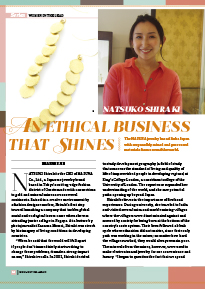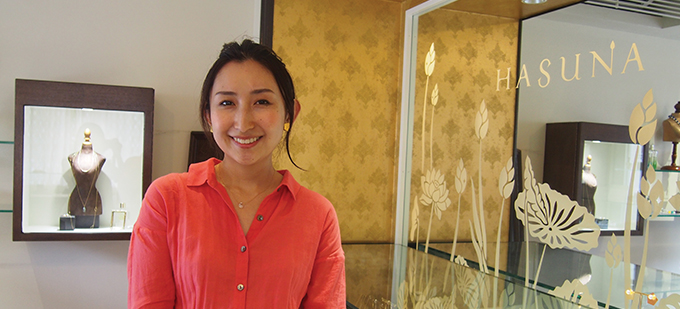Home > Highlighting JAPAN >Highlighting Japan August 2015>Women in the Lead
Highlighting JAPAN

Women in the Lead
Natsuko Shiraki
An Ethical Business That Shines
The HASUNA jewelry brand links Japan with responsibly mined and processed materials from around the world.

Natsuko Shiraki is the CEO of HASUNA Co., Ltd., a Japanese jewelry brand based in Tokyo’s cutting-edge fashion district of Omotesando with connections to gold and mineral mines across several continents. Raised in a creative environment by a fashion designer mother, Shiraki’s first step toward launching a company that tackles global social and ecological issues came when she was attending junior college in Nagoya. At a lecture by photojournalist Kazuma Momoi, Shiraki was struck by his imagery of living conditions in developing countries.
“When he said that the world will fall apart if people don’t immediately start working to change these problems, it made a strong impact on me,” Shiraki recalls. In 2002, Shiraki decided to study development geography (a field of study that concerns the standard of living and quality of life of impoverished people in developing regions) at King’s College London, a constituent college of the University of London. The experience expanded her understanding of the world, and she saw potential paths opening up beyond Japan.
Shiraki believes in the importance of firsthand experiences. During university, she traveled to India and visited several mica and marble mining villages where the villagers were discriminated against and scorned by society for being born at the bottom of the country’s caste system. Their lives followed a bleak cycle where education did not matter, since their only path was working in the mines; no matter how hard the villagers worked, they would always remain poor. The minerals from the mines, however, were used to make electronics and jewelry for our convenience and luxury. “I began to question the fact that we spend a lot of money to purchase these items, and yet the miners continue to live deprived lives,” Shiraki says.
After graduating from the University of London, Shiraki interned at the United Nations Population Fund in Vietnam before returning to Japan in 2006 and joining an investment fund to further her understanding of business. Building off this business experience, in 2009 Shiraki made her dream of combining her creative nature and social business come true when she established HASUNA Co., Ltd., named after the hasu (lotus flower) as a symbol of purity in the process and creation of jewelry making.
The materials used to make HASUNA jewelry are mined and procured from countries like Rwanda, Peru, Micronesia, Columbia, Belize and Canada. Shiraki visits the mines and distributors to confirm their ethical practices as well as to provide leadership to bring about positive change. For example, at a jewel-polishing factory in northern Pakistan, Shiraki urged the poor women working there to apply and further hone their skills to create top-class products that could be sold at Japanese department stores alongside the world’s top brands. It is important for her to speak with the local people to understand their circumstances. “People’s values differ between countries,” she says. “You cannot simply apply your own values to another country. You have to understand the environment and social circumstances of the people who will be affected. It’s important that you grow as you work to bring about a positive effect.”
In 2014, Shiraki’s dedication to using ethical diamonds, gold and other materials led the Responsible Jewellery Council to give HASUNA its RJC certification—the first Japanese jewelry company to be so recognized. The certificate verifies that companies follow a strict criterion of ethical practices, including human rights, labor rights, environmental consciousness and responsible mining. Shiraki also works with NGOs like Shigoto no aru Kurashi [profiled in this issue on pages 18-19], which helps street children in Rwanda train at a workshop to help them gain financial independence.
Nonprofit volunteer groups are able to tackle issues that governments cannot, making the relationships between them and social businesses crucial. Shiraki herself lectures at seminars in Japan. Through her lectures and books, Shiraki hopes to encourage young people to go abroad to realize that many more paths exist beyond those in Japan. “Experiencing and understanding the world gives one the strength to live,” she says.
© 2009 Cabinet Office, Government of Japan






